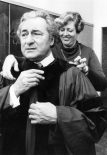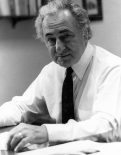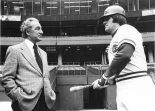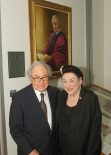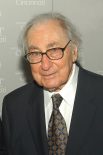Thursday, October 27, marks the 100th anniversary of the birth of Dr. Henry R. Winkler. Winkler served as President of the University of Cincinnati from 1977 to 1984. Among the 29 presidents who have stood at the helm of the University, Winkler remains the only one who also was an alumnus.
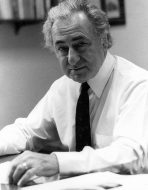
Henry R. Winkler, UC, c. 1978. Image Courtesy Archives & Rare Books Library, University of Cincinnati.
He is remembered as a president who “was the epitome of the learned gentleman,” says Kevin Grace, University Archivist at UC’s Archives and Rare Books Library. “He was a very kind man who deeply cared about UC heritage and its academic mission.”
The greatest of Dr. Winkler’s characteristics “was his community involvement,” Grace continued. “He knew that the university needed to be a public servant to the city of Cincinnati and that was the way he conducted his life as well – serving community organizations in the sincere belief that that was the way we bettered ourselves.”
Henry Winkler was born on October 27, 1916 in Waterbury, Connecticut, to an Orthodox Jewish family. His intellectual father encouraged Henry in his interest of intellectual pursuits and his love of reading. As a young man, Winkler was most inspired by two books, Paul De Kruif’s Microbe Hunters, which made him seriously consider the medical profession for a time, and G. M. Trevelyan’s histories of Garibaldi and the making of Italy.
Because of the scarcity of work during the depression and his father’s job as an instructor at a Hebrew school, the family’s life was a transient one, moving from school to school when jobs became available. Henry graduated from Jefferson High School in Elizabeth, New Jersey as valedictorian in 1933.
He was awarded a tuition scholarship to Rutgers University but neither he nor his parents could afford the remainder of the cost, and so he was unable to attend. Instead, he was invited to Cincinnati by an aunt and uncle who offered him room and board and the opportunity to attend classes at the much more affordable University of Cincinnati.
During his time as a student his academic interests inclined toward history and being a teacher, and his intellect and erudition continued to shine. Upon graduation with his B.A. in 1938, Winkler visited Europe on a fellowship but soon returned to the University of Cincinnati to obtain his master’s degree.
In 1940, he made plans to attend the University of Chicago to work on his Ph.D. It was also in August of that year that he married Claire Sapadin. A UC grad herself, the two met in an undergraduate history course. Their future plans were interrupted however by the war.
Winkler enlisted in the Navy in 1942 to be a part of a Japanese language specialist program. He did interrogation and document work in oral and written Japanese in the Philippines, New Guinea, and Australia, for the next four years.
Set on finishing his Ph.D. after the war, Henry and Clare, now with their young son Allan, returned to Chicago. Soon he was offered an assistant professorship at Rutgers and moved the family to New Jersey, where their second child, Karen, was soon born.
Over the next thirty years, Winkler worked at Rutgers moving through the faculty ranks as professor, British history scholar, Dean of the Faculty of Liberal Arts, Vice President, and finally Acting President.
As a result of cancer, Claire Winkler passed away in 1972 at the age of 56.
Dr. Winkler married Beatrice Chaikind Ross (Bea), a widow herself, in 1973. The two would be together for the rest of his life.
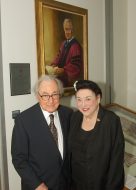
Dr. Henry Winkler and wife Bea at the dedication of the Winkler Center, 2009. Image courtesy of the Winkler Center for the History of the Health Professions, University of Cincinnati
In 1977, Dr. Winkler answered the call from his alma mater, the University of Cincinnati, to become “interim” president. The Board of Trustees soon determined the appointment should be a permanent one, and so began an eight-year term as UC’s 23rd President. It was a momentous era in which President Winkler led UC through its historic transition and transformation from a city to a state university.
Upon retiring in 1984, Dr. Winkler distinguished himself as a President Emeritus who remained active on campus and a familiar face at university events for 28 years following his presidential tenure.
As a president-emeritus, Dr. Winkler took an active interest in what was then known as the Medical Heritage Center, founded in 1974 on UC’s health campus. He served as the chair of the center’s advisory board for 20 years. His leadership helped the center grow from a collection of rare medical books and personal papers in the history of medicine to an internationally respected medical history archive and exhibit facility. It was Dr. Winkler’s dedication to the Center and devotion to its purpose that made the decision to name it in his honor an obvious one. It was renamed the Henry R. Winkler Center for the History of the Health Professions in Dr. Winkler’s honor in 2009. And his and his wife Bea’s generosity is largely responsible for the Winkler Center’s facility in the Donald C. Harrison Health Sciences Library at the Academic Health Center.
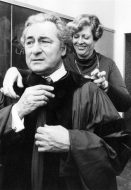
Inauguration of Dr. Winkler as President, with Arlene Thorwarth, 1978. Image courtesy of Archives & Rare Books, University of Cincinnati.
In addition to his scholarly career and administrative accomplishments, Dr. Winkler was one of a group of American historians who were with Martin Luther King, Jr. and the group that marched from Selma to Montgomery in 1965. He authored or edited seven books, his last being the 2005 work, British Labour Seeks a Foreign Policy, 1900-1940. Winkler told a university public relations spokesman in 2012 that he considered the volume edited with Kenneth M. Setton, Great Problems in European Civilization (1954), to be his most influential because it impacted how history was taught. His well-respected scholarship also included dozens of journal articles, book chapters, over 200 reviews and duties as the editor of the American Historical Review.
Among a lifetime of accolades and plaudits as a scholar, administrator and model pedagogue, what Henry R. Winkler valued most was “being able to bring up such a nice family.”
Dr. Winkler passed away in 2012 at the age of 96, survived by his wife Beatrice (Bea), his five children, and numerous grandchildren and great-grandchildren. His portraits hang at Langsam Library and the Winkler Center. Please visit the gallery below for more images of Dr. Winkler.
- Inauguration of Dr. Winkler as President, with Arlene Thorwarth, 1978. Image courtesy of Archives & Rare Books, University of Cincinnati.
- Henry R. Winkler, UC, c. 1978. Image Courtesy Archives & Rare Books Library, University of Cincinnati.
- Henry Winkler and Pete Rose, 10.23.78. Image courtesy Archives & Rare Books Library, University of Cincinnati.
- Dr. Henry Winkler and wife Bea at the dedication of the Winkler Center, 2009. Image courtesy of the Winkler Center for the History of the Health Professions, University of Cincinnati
- Dr. Winkler at the dedication of the Winkler Center, 2009. Image courtesy of the Winkler Center for the History of the Health Professions, University of Cincinnati
Related stories:
UC Mourns the Passing of President-Emeritus Winkler: http://www.uc.edu/news/NR.aspx?id=17088
When the President Retired, the Scholar Went Back to Work: http://www.uc.edu/news/NR.aspx?id=2407
To learn more about the Winkler Center please visit https://www.libraries.uc.edu/winkler-center.html.
Works Used
Marine, Steve. Correspondence. Biographical Files, Winkler Center for the History of the Health Professions, University of Cincinnati, Cincinnati Ohio.
Springer, Connie. Henry Winkler: The Consummate Professor. Unpublished Manuscript. Biographical Files, Winkler Center for the History of the Health Professions, University of Cincinnati, Cincinnati Ohio.
Winkler, Allan. Give Me The Roses: A Homage to and Memoir of My Father. Presented to the Literary Club of Cincinnati, May 14, 2012. Biographical Files, Winkler Center for the History of the Health Professions, University of Cincinnati, Cincinnati Ohio.
Winkler, Henry R. Some Notes on a Long Life. Unpublished Manuscript. Biographical Files, Winkler Center for the History of the Health Professions, University of Cincinnati, Cincinnati Ohio.

